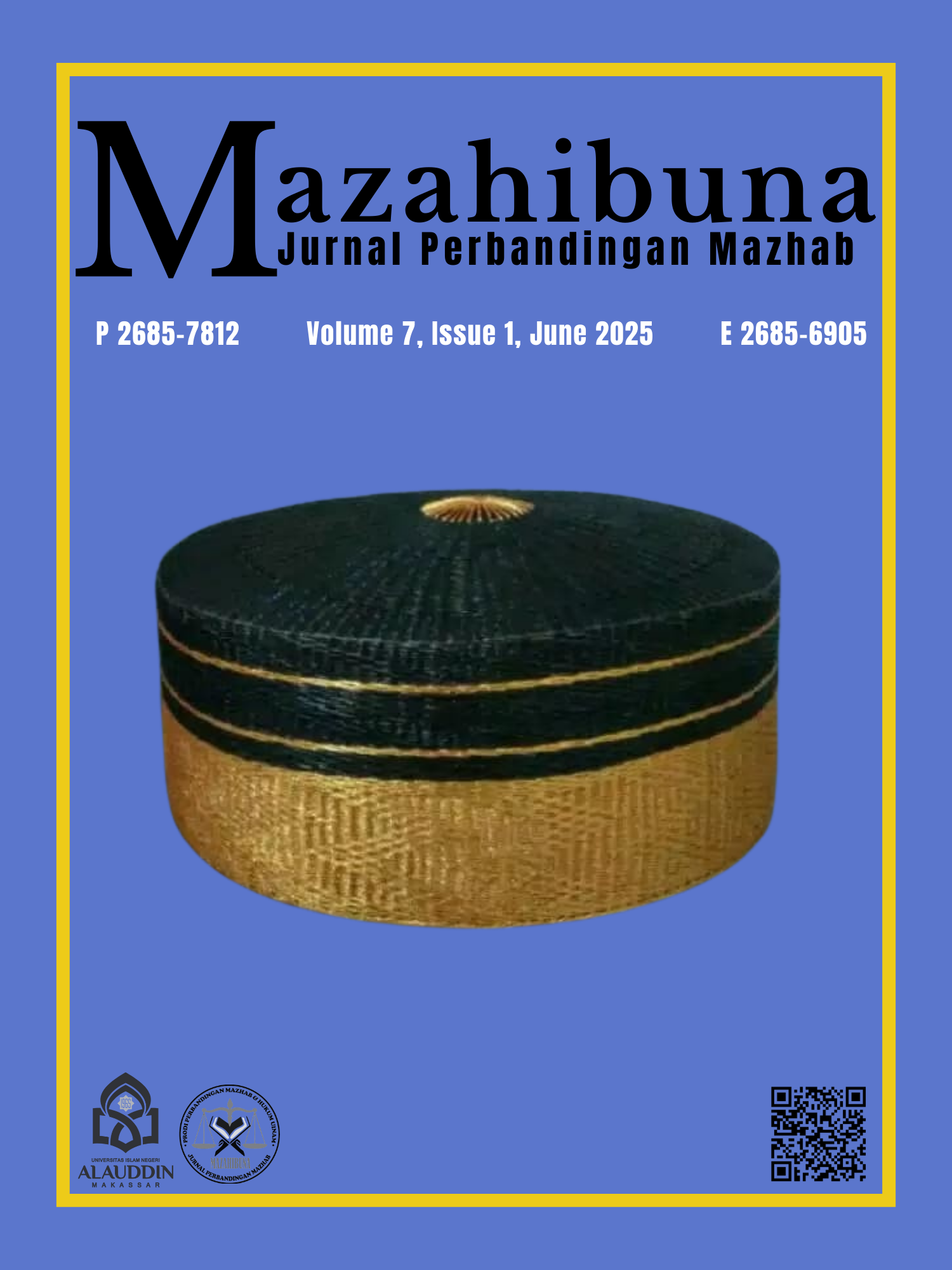Ijtihād Maqāṣidī and Legal Adaptation
A Comparative Analysis of Contemporary Islamic Jurisprudence in Responding to Emerging Issues
DOI:
https://doi.org/10.24252/mazahibuna.vi.54378Abstract
This study aimed to examine the significance of ijtihād Maqāṣidī in contemporary Islamic jurisprudence, focusing on its role in addressing legal and ethical dilemmas. The study explored how Islamic law remains adaptive and relevant in modern contexts by analyzing different scholarly perspectives on Maqāṣid al-Sharīʿah. A qualitative method was adopted, utilizing doctrinal analysis and comparative methodology. Primary and secondary Islamic legal sources, including classical and contemporary juristic opinions, were analyzed to evaluate different schools of thought regarding ijtihād Maqāṣid. Additionally, case studies such as the COVID-19 pandemic and the moon sighting debate were examined to show practical applications of Maqāṣid in Islamic legal reasoning. The result showed three primary methods among contemporary scholars, namely (1) scholars who consider Maqāṣid as an independent legal proof, (2) those who limit Maqāṣid only to explicitly supported textual evidence, and (3) the moderate scholars who integrate textual sources with Maqāṣid to develop balanced legal rulings. The result reflected the strengths and weaknesses of each method, showing how Maqāṣid-based reasoning improves the adaptability of Islamic jurisprudence. This study provided a comprehensive examination of Maqāṣid’s role in contemporary Islamic legal thought, offering a distinct understanding of ijtihād Maqāṣidī beyond traditional jurisprudential analyses. By integrating historical and modern perspectives, the results contributed to ongoing debates on the evolution of Islamic legal methodologies. Furthermore, there was a need for incorporating ijtihād Maqāṣid in modern legal discourse to ensure that Islamic law remained relevant and effective in addressing new societal challenges. This study also advocated for a structured application of Maqāṣid in judicial and legislative frameworks, promoting further investigation into its potential in legal reform and policy-making in Islamic jurisdictions.
References
Abd Wahab, N., Katuk, N., Hussain, M. A., Zainol, Z., Maamor, S., & Kamis, N. S. (2024). A Proposed Framework of Islamic Inheritance and Estate Planning of Digital Assets: the Malaysian Case of Crypto Assets. ISRA International Journal of Islamic Finance, 16(2), 45–64. https://doi.org/10.55188/ijif.v16i2.713.
Ahmad, K., Maabreh, M., Ghaly, M., Khan, K., Qadir, J., & Al-Fuqaha, A. (2022). Developing Future Human-Centered Smart Cities: Critical Analysis of Smart City Security, Data Management, and Ethical Challenges. Computer Science Review, 43, 100452. https://doi.org/10.1016/j.cosrev.2021.100452
Ahmed, H. (2022). Islamic Capital: Ethical Foundations Of An Equitable Economic System. In Durham University Business School. Durham University Business School.
Downloads
Published
How to Cite
Issue
Section
License
Copyright (c) 2025 Mahroof Athambawa

This work is licensed under a Creative Commons Attribution 4.0 International License.

This work is licensed under a Creative Commons Attribution 4.0 International License.
Authors who publish with Mazahibuna: Jurnal Perbandingan Mazhab agree to the following terms:
- Authors retain copyright and grant the Mazahibuna: Jurnal Perbandingan Mazhab right of first publication with the work simultaneously licensed under Creative Commons Attribution License (CC BY 4.0) that allows others to share the work with an acknowledgment of the work's authorship and initial publication in this journal.
- Authors can enter into separate, additional contractual arrangements for the non-exclusive distribution of the published version of the work (e.g., post it to an institutional repository or edit it in a book), with an acknowledgment of its initial publication in this journal.
- Authors are permitted and encouraged to post their work online (e.g., in institutional repositories or on their website) before and during the submission process, as it can lead to productive exchanges, as well as earlier and greater citation of published work.










